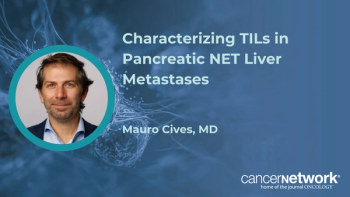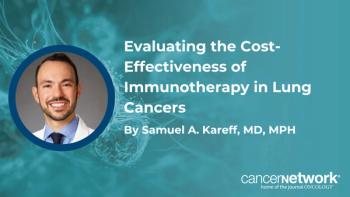
Primary Transoral Surgery Yields Good Swallowing Outcomes Despite Increased Risk of Death in HPV-related OPSCC
Despite an increased risk of grade 5 toxicities, patients with human papillomavirus–related oropharyngeal squamous cell carcinoma who received primary transoral surgery and neck dissection vs radiotherapy experienced good swallowing outcomes at 1 year.
Good swallowing outcomes were observed at 1 year among patients with human papillomavirus (HPV)–related oropharyngeal squamous cell carcinoma who were treated with primary transoral surgery (TOS) and neck dissection vs radiotherapy despite an increased risk of developing grade 5 toxicities, according to findings from the phase 2 ORATOR2 trial (NCT03210103).
At a median follow up of 17 months, investigators reported 3 deaths in both the TOS and neck dissection arm, 2 of which were treatment related and 1 due to myocardial infarction at 8.5 months. The 2 treatment-related deaths were reported following TORS and were due to oropharyngeal hemorrhage and cervical vertebral osteomyelitis.
Moreover, investigators reported 4 progression-free survival (PFS) events in this arm, 3 of which were mortality events and 1 due to local recurrence. As such, overall survival (OS) and PFS data were considered immature at the time of study. In total, 67% of patients in the radiotherapy arm and 71% in the TOS and neck dissection arm experienced grade 2 to 5 toxic effects.
The study included patients who were 18 years or older with T1 to T2 disease and N0 to N2 staging. Those who enrolled were randomized 1:1 to either the primary radiotherapy group, including 60 Gys followed by concurrent weekly cisplatin chemotherapy at 40 mg/m2 in the node-positive population, or the TOS and neck dissection arm. Patients were required to have HPV-related disease via p16 positive status, real-time polymerase chain reaction, or in situ hybridization.
The study’s primary end point is OS compared with historical controls. Additionally, key secondary end points include PFS, quality of life, Voice Handicap Index (VHI-10), Neck Dissection Impairment Index, Patient Neurotoxicity Questionnaire, and EuroQol 5-Dimension 5-level.
A total of 61 patients enrolled at 9 institutions, 30 of whom received radiotherapy and 31 received TOS and neck dissection. The median age was 61.9 years, 51% of patients were never smokers, and 86% were men. Additionally, 8% of patients didn’t undergo a protocol-specific treatment.
Among those who received surgery (n = 27), 93% received TORS and 7% received transoral laser microsurgery. Moreover, 56% of patients underwent an ipsilateral neck dissection and 44% underwent bilateral dissection. There was also a 100% external carotid artery ligation compliance rate. A total of 65% of patients in the total surgery arm (n = 31) underwent temporary tracheostomies to protect airways following surgery. Negative margins were reported in 67% of patients, 26% had close margins of less than 3 mm, and 7% had positive margins. In total, 78% of patients in this arm underwent adjuvant radiotherapy at a median dose of 52 Gy. Notably, no one required concurrent chemotherapy.
In the radiotherapy arm, patients received a median dose 60 Gy. Moreover, 72% of patients underwent concurrent chemotherapy.
The mean 1-year MD Anderson Dysphagia Inventory scores were 85.7 in the radiotherapy arm compared with 84.7 in the TOS and neck dissection arm (P = .85). There were no differences between arms for European Organisation for Research and Treatment of Cancer H&N35, Voice Handicap Index, Patient Neurotoxicity Questionnaire, EuroQol 5-Dimension 5-Level, and Neck Dissection Impairment Index scores.
A percutaneous feeding tube was required in 1 patient per arm, although no patients had a feeding tube past 1 year. A total of 81% of patients in the radiotherapy arm and 38% of patients in the TOS and neck dissection arm were assessed by Functional Oral Intake Scale and scored at the highest level with total oral diet with no restrictions (P = .05). Total oral diet with multiple consistencies and special food limits, the second highest score, was determined in 19% and 46% of patients in both respective arms. Moreover, 15% of patients in the TOS and neck dissection arm were determined to need special preparation.
Reference
Palma DA, Prisman E, Berthelet E, et al. Assessment of toxic effects and survival in treatment deescalation with radiotherapy vs transoral surgery for HPV-associated oropharyngeal squamous cell carcinoma. JAMA Oncol. 2022;8(6):1-7. doi:10.1001/jamaoncol.2022.0615
Newsletter
Stay up to date on recent advances in the multidisciplinary approach to cancer.












































